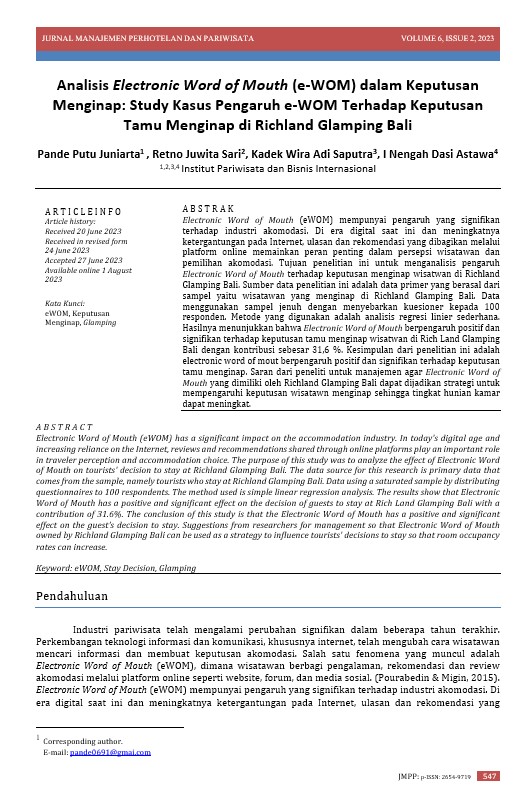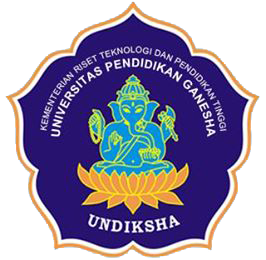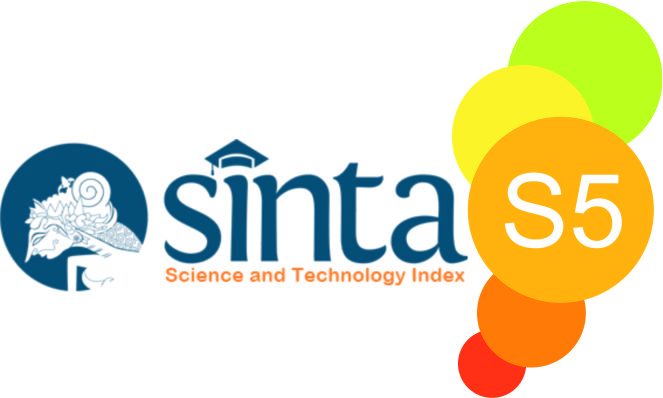Analisis Electronic Word of Mouth (e-WOM) dalam Keputusan Menginap
Study Kasus Pengaruh e-WOM Terhadap Keputusan Tamu Menginap di Richland Glamping Bali
DOI:
https://doi.org/10.23887/jmpp.v6i2.64036Keywords:
eWOM, keputusan menginap, GlampingAbstract
Electronic Word of Mouth (eWOM) has a significant impact on the accommodation industry. In today's digital age and increasing reliance on the Internet, reviews and recommendations shared through online platforms play an important role in traveler perception and accommodation choice. The purpose of this study was to analyze the effect of electronic word of mouth on tourists' decision to stay at Richland Glamping Bali. The data source for this research is primary data that comes from the sample, namely tourists who stay at Richland Glamping Bali. Data using a saturated sample by distributing questionnaires to 100 respondents. The method used is simple linear regression analysis. The results show that electronic word of mouth has a positive and significant effect on the decision of guests to stay at Rich Land Glamping Bali with a contribution of 31.6%. The conclusion of this study is that the electronic word of mouth has a positive and significant effect on the guest's decision to stay. Suggestions from researchers for management so that electronic word of mouth owned by Richland Glamping Bali can be used as a strategy to influence tourists' decisions to stay so that room occupancy rates can increase.
References
Finora, R. T., & Putra, T. (2020). Pengaruh electronic word of mouth terhadap keputusan menginap di Hotel Daima Padang. Jurnal Pendidikan Dan Keluarga, 11(02), 65. https://doi.org/10.24036/jpk/vol11-iss02/643
Juniarta, P. P., Wardana, M. A., & Saputra, K. W. A. (2022). Persepsi wisatawan milenial terhadap akomodasi glamping di kawasan Kintamani. Jurnal Ilmiah Pariwisata, 27(2), 145–152.
Kavanillah, D., & Ridlwan, A. A. (2018). Pengaruh bauran pemasaran jasa terhadap keputusan menginap di Hotel Andita Syariah Surabaya. Jurnal Ilmu Dan Riset Manajemen, 7(2), 146–164.
Pourabedin, Z., & Migin, M. W. (2015). Hotel experience and positive electronic word of mouth (e-WOM). International Business Management, 9(4), 596–600. https://doi.org/10.3923/ibm.2015.596.600
Suarsa, S. H. (2020). Pengaruh electronic word of mouth (ewom) pada online travel agent (ota) Traveloka terhadap keputusan menginap di Topas Galeria Hotel, Bandung. Eqien: Jurnal Ekonomi Dan Bisnis, 7(1), 50–56. https://doi.org/10.34308/eqien.v7i1.112
Sugiyono, D. (2013). Metode penelitian pendidikan pendekatan kuantitatif, kualitatif dan R&D. Alfabeta.
Sulthana, A. N., & Vasantha, S. (2019). Influence of electronic word of mouth eWOM on purchase intention. International Journal of Scientific and Technology Research, 8(10), 1–5.
Ul’fah Hernaeny, M. P. (2021). Populasi dan sampel. Pengantar Statistika 1, 33.
Utami, N. K. Y. (2020). Glamping sebagai sebuah perspektif baru dalam akomodasi berkemah. Jurnal Arsitektur ZONASI, 3(3), 285–294. https://doi.org/10.17509/jaz.v3i3.27854
Vrtodušić Hrgović, A.-M., Cvelić Bonifačić, J., & Licul, I. (2018). Glamping–new outdoor accommodation. Ekonomska Misao i Praksa, 2, 621–639.










